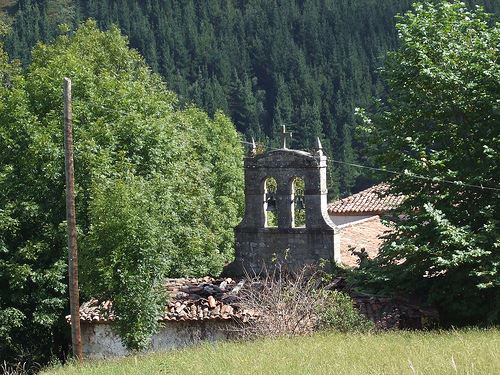Legal tip 186. The unsustainable Sustainable economy Act
Monday, November 30, 2009
The Government approved on last Friday, the 27th, the draft bill on sustainable economy, which was founded with the intention of establishing an evolution pattern towards a new production model.
Sustainable seems to be the most "politically correct" adjective these days, a kind of magic word which almost transforms in approvable all which contains it. Beware... my instinct says!
It seems that the draft suffer from much lack of definition, as it has been commented by the press media.
Among all the packages, that of housing seem to be the most concrete. No other option really.
Some measures:
- Rebate of 10% on rehabilitation works carried out in homes to improve energy efficiency, water consumption or accessibility. Entering into force 1st of January 2011.
- Maintains deduction on the purchase of main residence for taxpayers with taxable income lower than 17,707 euros and graduates relief up to the 24,107 euros. Above that cap, the deduction disappears from January 2011. The tax treatment of those who bought housing before 31st of December 2010 will be respected.
- To boost the rental market, as crucial to mobilize the massive stock of vacant houses, it equates the tax treatment in respect of rental deduction to the deduction for housing investment. The housing tenant may deduct 10.05% of rent payments up to 9040 per year if he/she has an income below 17,707 euros entering into force 1st of January 2011.
The drfat is a total resignation to the regulation of the finantial sector: who will bell the cat? The draft just establishes some regulations to improve the oversight of the financial sector by requiring listed companies to report the individualized remuneration of its executives. The shareholders' meeting must approve these remunerations as part of their agendas. Bank of Spain will oversee remunerations of banks and saving banks.
What about liabilities related to financiation? Just that would have be enough to balance the system and place some sustain into the market. Come on! Let´s get right to the point: we have already lose all the available time.
Another initiative to improve the economic environment is to control delinquencies. The government is committed to reduce the period of payment of bills from 60 to 30 days in 2013, requiring greater control of payments for the Local Councils. For the private sector imposes a maximum period of 60 days.
The new law will be launched in summer 2010. It seems it is coming to celabrate something. I do hope the party will not be cancelled and we all can attend!
Maria L. de Castro
www.costaluzlawyers.es

Autumn in Asturias by Luciti at Flickr.com
(108).jpg)
 0
Like
Published at 1:03 PM Comments (0)
0
Like
Published at 1:03 PM Comments (0)
Legal tip 185. Fraud of Law and Banks megacorruption
Wednesday, November 25, 2009
The Breach: A Fraud of Law, according to the Spanish civil Code is made when an act is made under the coverage of a Law but aiming a result whish is forbidden by or against the legal order.
The Penalty: These acts will be considered as commited in Fraud of Law and the norm which has been tried to be avoided will be applied.
In simple terms: a fraudulent use of Law is punished with the correct use of it.
In our area of interest:
A bank and a developer trying to avoid the obligation of issuing and securing the issuing of Bank Guarantees under the coverage of the bank not opening a "special bank account"... will produce the application of the Law whih has been tried to be avoided and will result in the payment of deposit plus legal interests by the Bank.
I have been discussing this option with one of the Professors of Civil Law in University of Seville, which I attended for my Law degree ( 1990-1995), a great academician who won his Ph D where the best do it : The Spanish College at Bologna.
I specially enjoyed the last sentence of his today´s email:
"Y es un placer que encontraras la forma de meter el diente a la megacorrupción bancaria que se extendió en la última década.." ( It is a pleasure that you found the way to get your teeth into the Banks´ mega-corruption which was spreaded during the last decade) 
Golden Colours in Aranjuez, Spain by Albert78000 at Flickr.com (109).jpg)
   
 0
Like
Published at 10:52 AM Comments (2)
0
Like
Published at 10:52 AM Comments (2)
What if...? Some whispers to Rajoy
Tuesday, November 24, 2009
I am starting today a new serie of blogpost named " What if..." for those posts which are not a legal tip so you can have more variety and fun. They generally are some commentaries of social, political, cultural events. I promise they will be secondary to the legal tips as theese last ones are what I am here for... your education in Spanish Law.
I would certainly appreciate suggestions on legal topics you want me to cover. Come on!
let´s start sith What if...? Number 1 and some phrases by Mariano Rajoy yesterday to “The Economist”: some proposals by us too:
Rajoy: “Ultimately the optimism that I argue when discussing the future of Spanish economy is based on the adjustment capacity of our businesses and our families: debt reduction, cost containment and the pursuit of international markets are positive factors already on the way” All this is being done and at an accelerated rate. Once again the Spanish society has proved its ability to adapt to circumstances.
Maria: Containment, adjustment capacity and taste for the foreign neighbours: all in the blood of Andalusians maybe because of our family oriented culture. We can do it, wonderfully, we just need to believe we can and give value to what has always been genuinely ours: potajes, ferias, romerias, rosquillas compartidas, and aquí hay sitio pa´ to´s….traditional inexpensive fun full with life and colour which naturally attracts visitors more than other artificial paradises we were constructing lately.
Rajoy: The exercise must be, therefore, the opposite. We have to define what we have money for and what we do not have money for and see who is competent to manage that money.
Maria: Ok. Let´s show some guidelines to financial institutions. They need rules, extra-finantial orientation and reality. It seems they sometimes just lose the contact with real life.
Rajoy: In the second, in the financial market, much remains to be done. The restructuring has only just begun. It has to do orderly and efficient. The only reasons that should prevail in the when making decisions have to be economic, and rules of game must be equal for all. On this issue I just want to say a thing: a solid and reliable financial sector is the only instrument capable to
grant credit to the Spanish production, credit which does not have right now. On this subject I would like to make additional observations: The lack of dynamism in the housing market is preventing the sanitation of the financial institutions and this in turn limits the credit they grant to businesses and families.
Maria: Oh my! I Think is exactly the opposite: the lack of dynamism of the financial institutions is over collapsing the housing market and this is deteriorating businesses and families. They, who over financed and over provided for the the building of that huge stock of houses need to responsibly now lead the adjustment of the markett o be rationally and balanced-ly absorbed by their addressees. The little persons, those for whom institutions exixst. If not…. Banks are no more than egocentric institutions that need to be punished for this anti-social behaviour.
Rajoy: We must break this vicious cycle. It has increased fivefold, from 88 to 420 days, the average time selling the property, and it is estimated that the financial sector will take over some 100,000 properties in late 2009 and many more in 2010. Many unsold homes, and many of them in the hands of the entities financial. It is necessary to sell, and therefore propose that those entities to be restructured with public money, in the Froben, offered for sale at deep discounts their property. It would streamline the market and would reduce the unsold properties and socially affordable housing could be in the market.
Maria: Yeah! That is dynamism of the financial sector affecting positively the housing market and life of businesses and economies. Social responsibility for Banks. Social Responsibility for Banks.
 0
Like
Published at 11:59 AM Comments (0)
0
Like
Published at 11:59 AM Comments (0)
Legal tip 184. Much more than simply rights
Thursday, November 19, 2009
On last 30th in October in the South Korean city of Busan, it was held the World Forum organized by the OECD on "Statistics, Knowledge and Policy" to discuss the report prepared by the so-called Commission Stiglitz on "The Measurement of Economic Performance and Social Progress ". How I would have liked attending! , but hey, we were here in Algeciras trying to make the legal defence of English-speaking foreigners in our country a sustainable reality. 
This commission is led by two Nobel Prize economists: Joseph Stiglitz and Amartya Sen, being the coordinator Jean Paul Fitoussi. The central matter of discussion was the still open debate on the current practice of using GDP (Gross Domestic Product) as the statistic indicator for measuring wealth and progress of a country. The need to reach a consensus on what constitutes "social progress" was remarked.
The Stiglitz Commission report notes that the official statistical agencies should develop indicators that reflect not only material wealth but also its distribution. It also notes that the family, leisure time use and other concepts such as security must be analyzed and measured as part of a country's social development.
Without any doubt, the discussion was influenced by the experience of our current crisis. Who has not come to sense in recent months that we had a crazy and wrong path? These are the good fruits of the crisis that, while painful, are almost always necessary. After- crisis- times are perfect to set the axis and the centre of our steps on the person.
And I think… what about the entrepreneurs who built much of the social fabric? Before the end of this 2009, we would seriously take a reflexion on:
- Our policies to reconcile work and personal life
- Ecological Marketing
- Flexibility and teleworking
- Corporate Social Responsibility
- Climate among employees
- In essence: Is our company really making our staff member’s lifes better, fuller lifes? And not just in the financial sense…
Again, person, human beings, at the heart of our busineses and enterprises. As an entrepreneur, I am sure everyone wins this way. The company earns in staff commitment, involvement, fluency, and ability to resolve conflicts, stress management, attendance… Knowing and acknowledging our staff-members makes the river of creativity and productive work to flow with strength and harmony.
Animo, animo, animo ... you think it is not, but it is 150% worth it.

Calendula by Martius at Flickr.com
(112).jpg)
 0
Like
Published at 1:55 PM Comments (0)
0
Like
Published at 1:55 PM Comments (0)
Legal tip 183. Find a lawyer in Europe
Wednesday, November 18, 2009
Ten Councils of Lawyers across Europe have joined to create the project "Find a Lawyer" which aims to unify and standardize the databases of European lawyers with the aim of having a common census.
RedAbogacia, the technological society of the General Council of Spanish Lawyers (CGAE) shall be responsible for this task, becoming the first search tool of lawyers at the European level. European lawyers have chosen CGAE as a technology partner for the development of the project, after assessing the experience of this institution in creating the first comprehensive census of lawyers online. The application allows any citizen to locate a Spanish lawyer and consult certain professional data at: www.abogados.es, www.redabogacía.org y www.cgae.es
Translated from Cinco Días, 18-11-2009 
Craftwork in Chinchon by Martius at Flickr.com
(113).jpg)
 0
Like
Published at 11:01 AM Comments (0)
0
Like
Published at 11:01 AM Comments (0)
Legal tip 182. The Anti-corruption new Spanish Criminal Code: I miss...
Tuesday, November 17, 2009
The Criminal Code, agreed between the Government and the PP being still Ministry of Justice Mariano Fernandez Bermejo, was finally approved by the Government yesterday. Now it is being submitted to Parliament for final processing.
Among other developments, the new text includes increased penalties for crimes related to corruption and sexual abuse of children under 13 years and probation, a security measure that may apply to dangerous offenders (such as terrorists and rapists) once they have completed their prison sentences. It also provides for terrorist killings, which will never expire and re-classify the crime of piracy, which disappeared after the new criminal code dated 1995.
In its new reform, the Criminal Code aims to corner the corrupted either by a "more comprehensive" criminalization of bribery as by increasing the penalties for Urban Planning criminals who have to pay heavy fines and whose illegal incomes will always be confiscated.
For the first time, authorities and officials who turn a blind eye to illegal construction will also be punished. Prison sentences will also be increased, up to four years for each illegal work.
Also, in the field of urban planning corruption, this new Criminal code will expand the expiration timeframes of criminal offences and will punish both the inspectors who hide illegal acts and those who skip mandatory inspections.
In the private sector, and as it happens to bribery, it will punish the conduct of those who attempt to corrupt company managers.
Another important chapter covered by the reform is focused on child sexual abuse and child prostitution. A new creation will be the crime of recruitment of minors for pornographic performances, which will punish those who profit from it; it will also punish clients of prostitution when having relations with minors or persons unable to decide for themselves.
I miss: A strong regulation effort on financiation and public order. Financiation has been contemplated for decades as almost an independent reality which could escape to the need of consideration of the commun good and the public order. Clear legal principles to start with are very much needed as finances and finantial proffessions seems to be far from the outreach of that Law who reaches us all... and we all need rules.
What do you think?
It seems to be my passion these days... laws for the finantial sector.

Autumn leaves byJesuscm at Flickr.com
(114).jpg)
 0
Like
Published at 10:34 AM Comments (0)
0
Like
Published at 10:34 AM Comments (0)
Legal tip 181. A house in exchange of a Bank Guarantee
Monday, November 16, 2009
If you are interested in obtaining a mortgage loan to purchase a home, it is likely that the financial institution will offer more favourable conditions if the house is part of its property portfolio.
The two pathways that Banks are currently using to sell their large stocks are:
- More flexible criteria for funding: lowest differential rates and less costly commissions.
- Implement price reductions ranging on average between 20% and 30%.
Developers believe that this action by banks and savings banks constitutes unfair competition. Well... they might still need to make an effort in prices-downing.
A client wisely asked me the other day ... Would the Bank agree to pay me with a house in exchange for the amount they owe me by the execution of my Bank Guarantee? From what we are seeing: sure, is a matter for negotiation.

El Retiro de Madrid de Marga Castillo at Flickr.com
(115).jpg)
 0
Like
Published at 9:59 AM Comments (1)
0
Like
Published at 9:59 AM Comments (1)
Legal tip 180. Obligatory Insurance by developers. Ten years Insurance
Thursday, November 12, 2009
According to the 1999 LOE (General Building Act) the obligatory ten years insurance plan for building companies guarantees all damages caused by faults or defects in construction which directly affect the resistance of the building during ten years.
The developer is the policyholder and he is obliged by law to sign a ten years insurance plan. Actually, the end of works deed, once the construction is finished will not be allowed by the Notary if the insurance is not in place. The developer is also the assured party, and following the sale of the home, buyers become the beneficiaries of the insurance.
Individuals and companies involved in the construction process are accountable to the owners of the material damage caused to the building, provided they claim in time. Time limits for filing a claim vary depending on the importance of fault.
a) For 10 years, of material damages caused in the building due to defects or vices that affect the foundations, supports, beams, floor structure, charging wall or another structural elements, that directly compromise the mechanic resistance and the stability of the building.
b) For 3 years, of material damages caused in the building by defects or vices of the building elements or the installations that produce the breach of the habitability requirements.
c) For 1 year, of the material damages by vices or execution defects that affect the elements of finishing of the works within a year deadline.
It is very important to have written record of how the damage has occurred within the time set. Most advisable to do it through certified letter or burofax so that the sender can have acknowledgment of reception and date of reception of writing by the addressee.
Liability is individual for every building agent (developer, builder, architect…), however, when it is not possible to tell who was the responsible, accountability is asked in a jointly way.
Deadline to claim is of two years from the time such damages occurs.
Damages covered:
• Material damages that endanger the stability of the building (foundations, floor supports, beams, design errors).
• Material damages to secondary works, installations and equipment of the building (resulting from a major damage in the main building).
• Costs of repairs to eliminate the threat of subsidence.
• Cost of demolition and overburden (as a result of damages covered by the policy).
Optional Coverage:
• Secondary work
• Waterproofing of decks.
• Waterproofing of facades.
• Waterproofing and sealing of basements.
• Waiver of appeal against the builder.
• Waiver of appeal against the contractor and / or subcontractor.
• Waiver of appeal against the technical direction.
• Damage to pre-existing goods.
• Revaluation of insured sum and franchises.
Not covered damages:
• Body injuries or economic damage other than those protected by the General Building Act.
• Caused to properties contiguous or adjacent to the building.
• Caused to movables goods which are located within the building.
• Produced by works performed after the receipt of the building, except those made to fix construction defects
• Caused by misuse or lack of proper maintenance of the building.
• Those that have their origin in a fire or explosion, except those caused by defects in the facilities themselves.
The light of autumn by Cuellar at Flickr.com
 
      
(116).jpg)
 0
Like
Published at 11:03 AM Comments (15)
0
Like
Published at 11:03 AM Comments (15)
Legal tip 179. Swiss Financial Corporation is not authorised to operate in Spain
Tuesday, November 10, 2009
Some of you may have Insurance Policies issued by Swiss Financial Corporation, please know that these policies are effectively NO-THING as the said company is not authorised to operate in Spain.
Of course there are legal actions in order to protect those who were given these illegal papers! What a ...!
No picture for this post... I am too frustrated
(117).jpg)
 0
Like
Published at 11:10 AM Comments (3)
0
Like
Published at 11:10 AM Comments (3)
Legal tip 178. Fifteen years to claim against the developer
Tuesday, November 10, 2009
You finally just decided to walk away from your off plan purchase in Spain due to whatever reason, but no cancellation contract or any sort of other agreement is being signed between you and the developer…..
well, that is an unfinished or stand-by situation ( non closed or definitive) which can be finally concluded in two different ways:
A) The developer asking you to complete: if you cannot get a mortgage you have rights for the full devolution of your money.
B) The developer finding a new buyer and selling the unit to that other one. In that case, a cancellation contract between you and the developer needs to be signed before him being legally allowed to sell again. If this cancellation is not performed, he is comitting a double sale crime.
So....if you are leaving things in stand-by know that you have fifteen years to ask your developer for a refund of 80% of the money you paid as a deposit from the moment the house is sold to someone else if that happened; and, well, I am sure he will be willing to accept on this better than having a criminal punishment for double sale.
For the above reason it would be good for you to have records of the registration number of your unit in the land registry for periodical checks on ownership.

Tools and leafs in Sant Jaume de Frontanyà, Barcelona (Spain) by SantiMB at Flickr.com
(118).jpg)
 0
Like
Published at 10:03 AM Comments (14)
0
Like
Published at 10:03 AM Comments (14)
Legal tip 177. First Occupation License or nothing
Monday, November 9, 2009
Some arguments offered to those fighting today in the petition in Madrid. Arguments coming from Room 4 of the Malaga Appeal Court ( minor sorurce of Case Law in Spain), this quoting our National Supreme Court ( Major source of Case Law in Spain).
The first occupation of buildings is subject to administrative planning license: first occupation license. This legal requirement is mentioned in provision 21.1 of Local Corporations Regulation Services and provision 1.10 of Town Planning Discipline Regulations.
The lack of First Occupation License is a cause for contract cancellation according to settled case law of the Supreme Court (SSTS of 19 January 1990, 24 February and 26 April 1993, April 18, 1994, 28 May 1996 and 23 October 1997).
The risks arising from administrative and planning issues affecting the houses, which were not known by the purchasers at the moment of signing the private contracts, need not be borne by them. So.... the lack of them (due to administrative, planning problems) is clearly a breach of contract of the vendor, who is obliged to deliver a building equipped with the necessary administrative permits and licenses. (that is the object of the contract)
Malaga Appeal Court also states, that the “So-called first occupation license has no other purpose than that of contrasting that the building has observed what was approved by the Local Council through the building permit, this involves checking if they have met or not the conditions of this building permit and if the building meets the appropriate conditions of security and sanitation and can be enabled for the use to which it is intended.
Such license is also configured as a gateway to the contract of power supplies and the obligation to apply for such license is of the person who holds the building license ( the developer).
Some Supreme Court Case Law on the topic:
- (STS 3-11-99): “If the house does not have the license can not be of lawful use or occupation”.
- (STS 30-11-84): "A thing is the finishing of the work, which is accredited by the relevant end of works certificate by the Architect and quite another is the issuance of the certificate of occupancy, which concerns the Administration and authorizes the property to be used”.
- (STS 30-09-1987) "The said certificate of end of works is a prerequisite for obtaining the Certificate of Habitability, which certifies the safety and healthy conditions of the house for occupation and allows the hiring of water supply and electricity
- (STS 11-12-1995 "There is no point about finishing the building or placing the furniture or even, delivering the apartments unless those are accompanied by their respective licenses”
- (STS 11-12-1995) "The physical completion of the work without obtaining licenses for habitation and occupation means the contract can not be considered completely fulfilled”.

Autumn in Jardin del Principe, Aranjuez, Spain by Gusjer at Flickr.com
(119).jpg)
 0
Like
Published at 2:58 PM Comments (0)
0
Like
Published at 2:58 PM Comments (0)
Legal tip 176. Easy "rent with option to buy" market
Friday, November 6, 2009
As you all know, many developers who built flats to be sold and now can not find buyers are trying to allocate the property “to rent with option to buy”.
The taxes doctrine stipulated that this pass from the sale to the rent market represented an auto-consume and therefore they could not deduct the VAT paid on the purchase of the ground or floor. This has been making very difficult for developers to turn sales into rents with option to buy.
A recent consultation of the General Office for Taxes, states that a housing developer may deduct the VAT when putting their properties on the market for rent with option to buy. So a door open for the strengthening of this sector of the real estate market.
In the other side, the tenant´s side: Congress last month approved a reduction from 16% to 7% on VAT paid by tenants in leases with option to purchase, which is another incentive to this form of rent.
Would you....?
Have a great weekend. Weather keeps being awesome in Spain. It feels like our September is still here!
Information obtained from Cinco Días, 06th Novemeber 2009

Autumn´s remains by Xavier Fargas at Flickr.com
(120).jpg)
 0
Like
Published at 3:45 PM Comments (0)
0
Like
Published at 3:45 PM Comments (0)
Legal tip 175. New Law: Speed for Courts in Spain
Thursday, November 5, 2009
Law 13/2009 on reform of procedural acts for the creation of the judicial office was published yesterday in the National official Gazette and will come into force in May 2010. This Law implements the new judicial office and its main objective is to discharge Judges from non-judicial functions, by giving more tasks and responsabilities to Court clerks.
First good new: This Law also opens the "small claim procedure" ( procedimiento monitorio) to claims of up to 150.000 €. Statistics show that more than 50% of the small claims procedures end up with an in-court settlement which avoids long declarative contradictory procedures.This will also work for a discharge of the courts' load...... and for a relief in the anxiety of claimers... for sure!
Second good new: Judicial auctions will be made through the Internet. No physical presence in the Court is needed anymore. This encourages participation, transparency and publicity of the auction. This promotion of the publicity of these events will also drive to better prices and most importantly will prevent collusive practices or the "old known" arrangements of auctioneers to monopolize these assets at prices well below market.
As part of the promotion of good judicial practises, all the procedural acts ae introucing different mechanisms for the join of actions, procedures, appeals or executions in order to avoid the unuseful multiplicity of action when a number of procedures have the same object.

Ermita de San Juan ( Palencia) by Kike & Laura at Flcikr.com
(121).jpg)
 0
Like
Published at 12:00 PM Comments (3)
0
Like
Published at 12:00 PM Comments (3)
Legal tip 174. Those illegal bank Guarantees
Wednesday, November 4, 2009
It is a very simple and obvious observation, there is no need of much legal rethoric or argumentation: the conditions of Bank Guarantees 57/68 were established by Law as inalienable and once the Bank or the Insurance company freely decides to issue these guarantees ( as part of a business relationship with the developer) ,they are issuing them according to the requisites, characteristics and imperatives of Law 57/68.
So if you find a Bank Guarantee or an Insurance Policy which in its main statements affirm that is issued according to the obligations of Law 57/68... you can stop reading the rest because regardless what they say, guarantee, limit.... they are actually, by force of the Law, obeying Law 57/68 which is above developers or guarantoors´ wills.
"Public Interest" is called in political and legal jargon. And rights created by legislator for the protection of public interests are inalienable, cannot be waived... whatever interests operate for the supression of them in a 57/68 Bank Guarantees... they are there... you cannot kill them.
In clear and practical terms: your Bank Guarantee:
- Do not expire till First Occupation License is granted AND the house is handed over to buyer
- Include full legal interests accrued from the moment buyer pay to developer to when the amounts are effectively refunded.
- Once the Guarantee is duly executed or the contract is cancelled, the judicial action is open for 15 years.
- Any wording of the Guarantee is valid, according to Bank of Spain.
- Original copy of the Guarantee is not necessary: also according to Bank of Spain.
Hope these are good news for many of you.
Maria L. de Castro

Ermita de los Remedios, Luena, Cantabria, Spain by Lumiago at Flickr.com
(122).jpg)
 0
Like
Published at 9:17 AM Comments (6)
0
Like
Published at 9:17 AM Comments (6)
Trampolin Hills under unsolvency procedings
Wednesday, November 4, 2009
The company "Trampolin Hills and Golf Resort SL" has been declared under insolvency proceedings by a decision passed by the Commercial Court Number Two of Murcia
The Court order indicates that the debtor "has been suspended from the exercise of the powers of administration and disposition of their assets, being these replaced by the judicial administration”.
This company was affected in their projects over a year ago when the Municipality of Campos del Río did not approve his plan, consisting on the building of 2,500 homes and other facilities in this county.
I wonder… who was to finance the project?

Ermita de L´abellera,Prades, Tarragona (Spain) by SantiMB at Flickr.com
(123).jpg)
 0
Like
Published at 8:17 AM Comments (2)
0
Like
Published at 8:17 AM Comments (2)
Spam post or Abuse? Please let us know
|
|